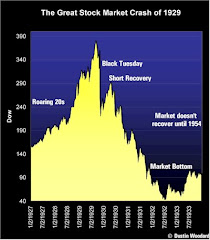A friend of mine, Lee Fairbanks, from Fairbanks & Cannon Management & Consulting sent me this email.
The G20 wants to reduce their deficits by 50% in 3 years - how will they do that? Raise taxes and cut services. That affects all of us - HST on gasoline anyone? Where does the stimulus money come from? Taxes - which we all provide one way or another. Time to face the facts.
Are we in a recession or a depression? Listen to Wall Street expert Bill Bonner explain why stimulus spending will not save our economy because it supports businesses that should be allowed to fail in a free economy: Bill Bonner: Son of StimulusOr just read the newspaper every day: Cities and States in the US going bankrupt; company and government pension underfunded with no way to recover. "Guaranteed" pensions being cut. Most of those pensions rely on never ending stock market growth. With so much stimulus money pumped into the Global economy we should expect that markets will have risen back to their pre-crash levels. Consider these stats from Jan. 2010 to July 2010:Dow Jones (US) up just 0.14% (virtually flat)Dow Jones (Europe) down 12.4%Dow Jones (Asian) down 4%Dow Jones (Global) down 9.2%In fact - The 10-year return on the Dow Jones and the TSE index is virtually 0% - as in zero, so any money invested there on 2000 has earned no growth in the past 10 years. The TSE is down 7% this quarter - where is your RRSP and your RESP invested?Truth is, today the only wealth you can count on is earned income - after taxes. And with taxes going up and services going down, for most people that spells one thing: tough times ahead.
Lee had asked me where I see future business opportunities. In response to our conversation Lee wrote.
Bill's facts are undeniable and they point to a future for Canadian Baby Boomers without the current level of "free" health care as they age. Provincial forecasts say that 70% of all tax spending would have to go to health care if the current levels are to be maintained. This is an ongoing increase, rising from 30% in 1981, to 45% in 2004.
Is there a solution?
Several things come to mind:
1. Stay healthy longer.
2. Make sure you have enough money to buy your own health care when you need it.
3. Diversify your income offshore to capitalize on growth markets with younger populations. (Bill's suggestion).
Bill has an excellent article that uses the Japanese experience (Japan is the first developed nation to face this crisis) to explain where Canada is in this cycle. - scroll past the headlines to read the article. Look closely at the charts, they are very revealing.
It appears that the IMF numbers show the same opportunities and challenges that Lee and I have identified. The developed nations of the world are collapsing under the weight of aging populations and the legacy, pension and healthcare costs that come with a greying population.
Emerging Economies
The emerging economies are poised to produce some stellar growth numbers in 2010 and beyond. You can see from the chart above the areas that are traditional growth drivers benefiting the emerging markets. These can be found in exports, industrial production and retail.
Brazil - 7.1%
China - 10.5%
India - 9.4%
Mexico - 4.5%
Many of these countries are on track for stellar growth. Mexico grew by almost 7% in the last quarter. Crecerá economía mexicana entre 6 y 7% en segundo trimestre: Santander
These numbers compare to Canada with an anticipated growth of 3.5% this year and 2.8% next year. Projections for Europe are dismal at only 1% growth.
Bill Tufts
Fair Pensions For All




No comments:
Post a Comment